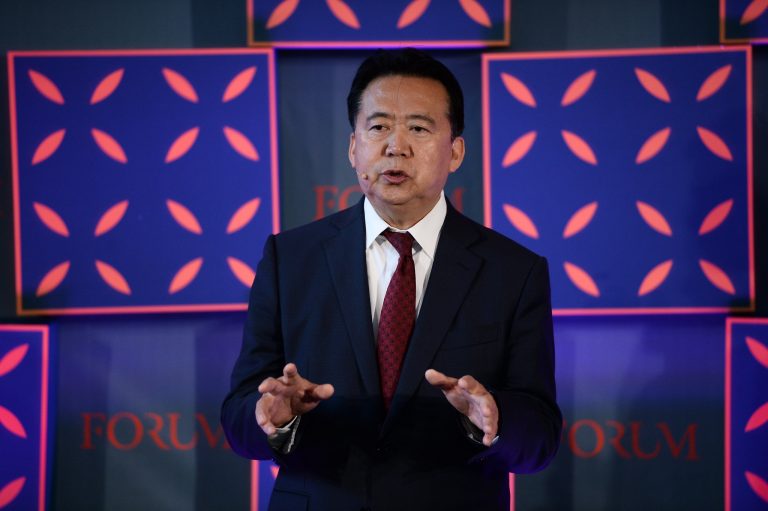The former Interpol president and vice-minister of public security in China, Meng Hongwei, has been formally expelled from the Chinese Communist Party (CCP) and removed from office, according to a statement from the Chinese authorities.
Meng was detained last September without warning during a return trip to China from the Interpol headquarters in Lyon, France. He was then put under investigation for serious violations of Party discipline.
Meng’s sudden disappearance caused an international stir, as he was only halfway through his 4-year term as chief of the international police organization. The affair also focused attention on the factional struggle within the ranks of the CCP leadership, with an analysis saying that Meng may have been complicit in a coup attempt against Chinese President Xi Jinping.
According to the CCP anti-corruption agency’s March 27 statement, Meng “refused to execute decisions from the Party center,” and abused his power for private gain. He also “wantonly squandered state funds to satisfy his family’s extravagant lifestyle,” and his wife Grace Meng, who is still in France, was said to have enjoyed privileges due to her husband’s malfeasance.
Under Xi’s leadership, thousands of high-ranking Party and government officials have been purged. The accused are typically apprehended, investigated, and expelled from the CCP and their positions in what is known as “double-expulsion,” or shuangkai in Chinese. Following this development, Meng is expected to stand trial.
Success
You are now signed up for our newsletter
Success
Check your email to complete sign up
The 2016 decision to make Meng president of Interpol was controversial, as he was a notorious persecutor of human rights in China and many feared he would use Interpol to track dissidents on behalf of the Chinese government.
Grace Meng has defended her husband vocally, revealing how the CCP threatened her and her family on multiple occasions following his disappearance. She is currently under protection by the French police.
During Xi Jinping’s recent summit with France’s President Emmanuel Macron, Grace Meng claimed that her husband was a patriotic official and “well-known for his reformist views,” according to France 24.

Grace Meng has defended her husband vocally, revealing how the CCP threatened her and her family on multiple occasions following his disappearance. (Image: YouTube / Screenshot)
Did Meng attempt a coup?
But according to political risk consultancy SinoInsider, Meng Hongwei is associated with the political faction of former CCP leader Jiang Zemin, and he may have even been involved in an attempt to unseat Xi in a “soft coup.”
According to the CCP anti-corruption agency’s Oct. 8 statement, Meng was arrested in part because of his ties to Zhou Yongkang. Zhou, who was handed a life sentence in 2015, was formerly head of the Political and Legal Affairs Commission, the Communist Party group that controls the entire police and judicial system of China.
Zhou, along with many other officials purged by Xi, was a close ally to Jiang Zemin, who used the PLAC as a major artery for consolidating and delegating power. As a result of Xi’s anti-corruption campaign, many of Jiang’s allies have been removed from office and imprisoned.
During the 15 years between 1997 and 2012 when Jiang was dominant, he and his supporters embezzled trillions of dollars, greatly expanded human rights abuses, and pushed reformist officials out of power.
Xi’s tough measures have earned him enmity with many Party cadres, whose interests and freedom have been impacted by the anti-corruption campaign. Disgruntled officials are loathe to carry out Xi’s policies, and sometimes take opportunities to work against his leadership.
The anti-corruption agency’s statements regarding Meng’s investigation, when placed beside the reference to Zhou Yongkang, emphasized the need for loyalty to Xi.
“When juxtaposed with the Zhou Yongkang reference, the meaning is clear — the leadership has been challenged by public security officials connected with a known coup plotter, and the security apparatus must hence make known its fealty to the leader,” a SinoInsider analysis article from Oct. 11, 2018, says.
SinoInsider noted that around the time that Meng was arrested, the Sino-U.S. trade war had been on for several months. In September, the United States raised tariffs again, targeting over US$200 billion in Chinese exports. The impact on the already-stuttering Chinese economy was considerable.
The analysis raised the likelihood that officials secretly opposed to Xi Jinping, including those with allegiances to the Jiang faction, could have been plotting a “soft coup” against the president, which could see Xi’s power reduced, if not remove him from office altogether.

Officials secretly opposed to Xi Jinping could have been plotting a ‘soft coup’ against the president, which would explain Meng Hongwei’s sudden arrest. (Image: U.S. Department of Defense Via Flickr / public domain)
Following Meng’s arrest, several retired officials connected with the Jiang faction made conspicuous public appearances, which, according to SinoInsider, “could be intended to signal to opponents of Xi Jinping that the Jiang faction still has political power and that the resistance to Xi should continue.”
Xinhua released a number of commentaries following Meng’s disappearance that played up rhetoric about the need to “eliminate interference” obstructing the progress of economic and political reforms.
“If our analysis that Xi is facing a ‘soft coup’ is accurate, then the Xinhua commentaries are meant to put the political power behind Meng Hongwei on notice while sending a strong political signal to the rest of the regime,” SinoInsider reported. Xi faces risks of being backstabbed during trade negotiations with the United States, as this would be an opportune moment for his enemies to accuse him of weakness and endangering the CCP’s interests.
On March 26, the day before Meng Hongwei was subjected to double-expulsion, China’s former Internet czar, Lu Wei, was sentenced to 14 years in prison. Lu had been arrested in November 2017.
Follow us on Twitter or subscribe to our weekly email














